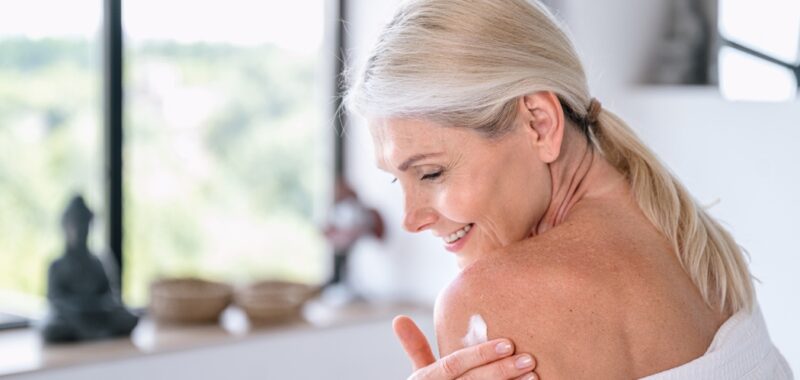As research into the mechanisms of ageing intensifies, in a demographic context where populations in many countries are growing increasingly older, attitudes are evolving rapidly. While the term “anti-ageing” no longer resonates with consumers seeking prevention, health, and ageing well, the fear of physical changes associated with age remains as strong as ever.
A social and individual phenomenon
Ageing is an inevitable process. Today, apart from some countries, it is estimated that one in two newborns will reach the age of 100, and the global population is expected to include 1.5 billion people aged 65 and over by 2050. Under these circumstances, is the main challenge not to age healthily to maintain quality of life?
Geroscience is dedicated to studying the biological mechanisms of ageing to improve our longevity and quality of life. Preventing and delaying rather than fighting, this approach suggests the ability to influence ageing. By harnessing this ability to modulate the mechanisms of ageing, it becomes possible to substantially improve overall health and well-being.
Recently, Retro Biosciences, a start-up dedicated to the development of anti-ageing therapies using AI, announced that it has set itself the goal of increasing healthy life expectancy by 10 years! [1]
Geroprotective agents
The term “geroprotector” was first coined by Ilya Mechnikov, a Nobel Prize winner in medicine. It refers to compounds that extend life expectancy in model organisms. “Geroprotectors” work in various ways to combat ageing. They can influence longevity pathways such as SIRT1, FOXO3, APOE, and KLOTHO. They also target senescent cells and activate telomerase to maintain long telomeres. They improve repair (healing) and regeneration.
The L’Oréal Group has recently positioned itself as an expert in skin longevity, seeking “geroprotectors” that target various cellular markers of ageing. Meanwhile, The Estée Lauder Companies unveiled its “Skin Longevity” platform (along with a collaboration with the Stanford Center on Longevity) and developed its proprietary SIRTIVITY-LP technology for the creation of the Re-Nutriv Ultimate Diamond Transformative Brilliance cream.
Among ingredient suppliers, research into exosomes, whether hybrid, derived from plant cells or of marine origin, is very active.

Stéphane Poigny, Mibelle Biochemistry
At Mibelle Biochemistry, PhytoCellTec Exosomes contains exosomes with a size of approximately 200 nm, obtained from the cultures of goji plant stem cells.
Stéphane Poigny, Director of R&D France at Mibelle Biochemistry, explains the uniqueness of this ingredient: “PhytoCellTec Exosomes works through two pathways; the first is a direct action via plant exosomes derived from Goji stem cells on keratinocytes to strengthen the skin barrier. The second, which is unique in the market, is the release of exosomes by mesenchymal stem cells directed towards fibroblasts, thereby improving the regeneration of the extracellular matrix (collagen) and skin renewal.“
In aesthetic medicine, exosomes derived from mesenchymal stem cells show potential in skin repair and regeneration, stimulating collagen and elastin synthesis, improving blood circulation and inflammation regulation, aiding scar repair and overall, improving skin quality.
“In 2023, we launched RejuveNAD, a natural booster of the longevity molecule NAD+, a potent solution for slowing down and reversing ageing by targeting five of the main hallmarks of ageing. This active immediately found its market because the results of the clinical tests are visually highly effective,” continues Stéphane Poigny.
The concept of Reverse Ageing
In February 2025, the term “cancer reversion” emerged thanks to a groundbreaking discovery aimed at reversing the cancer process by reprogramming malignant cells to restore their healthy, differentiated state. A team of researchers led by Professor Kwang-Hyun Cho from the Korea Advanced Institute of Science and Technology (KAIST) [2] identified a key molecular mechanism that reactivates the normal functions of malignant cells, causing them to stop multiplying uncontrollably and regain normal characteristics.
This breakthrough confirms the concept of reversion (first introduced in 2012 by Professor Yamanaka, Nobel Prize winner in medicine for reprogramming differentiated adult cells into induced pluripotent stem cells – iPSCs).

Virginie Couturaud, Dior
The first brand to communicate its findings on Reverse Aging is Dior in 2023, building on Lopez Otin’s scientific publication identifying 12 key markers of ageing.
For Virginie Couturaud, Director of Scientific Communication at Dior, “The first product ranges to benefit from the fundamental advances in Reverse Ageing are Dior Capture, which addresses stem cell depletion and acts on three pathways of ageing, Dior Prestige, which tackles chronic inflammation and targets five pathways of ageing overall, and the Or de Vie franchise, which already targets seven out of twelve markers of ageing. The specific routines, combined with our products, further optimise the visible effects of the formula on the signs of ageing.“
A new culture of ageing well is on the rise. The incredible progress in science and regenerative medicine offers the prospect of even more effective cosmetic products.

